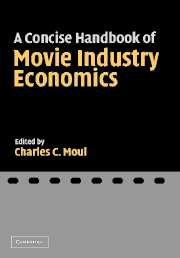Book contents
- Frontmatter
- Contents
- List of Contributors
- Introduction
- 1 Critiquing Hollywood: The Political Economy of Motion Pictures
- 2 Film Production in the Digital Age – What Do We Know about the Past and the Future?
- 3 Movie Industry Accounting
- 4 Theatrical Release and the Launching of Motion Pictures
- 5 The Film Exhibition Business: Critical Issues, Practice, and Research
- 6 Profits out of the Picture: Research Issues and Revenue Sources Beyond the North American Box Office
- Appendix
- Index
- References
3 - Movie Industry Accounting
Published online by Cambridge University Press: 02 December 2009
- Frontmatter
- Contents
- List of Contributors
- Introduction
- 1 Critiquing Hollywood: The Political Economy of Motion Pictures
- 2 Film Production in the Digital Age – What Do We Know about the Past and the Future?
- 3 Movie Industry Accounting
- 4 Theatrical Release and the Launching of Motion Pictures
- 5 The Film Exhibition Business: Critical Issues, Practice, and Research
- 6 Profits out of the Picture: Research Issues and Revenue Sources Beyond the North American Box Office
- Appendix
- Index
- References
Summary
Juxtapose the words “movie” and “accounting” and you have fodder for late-night television comedy or raging complaints by Hollywood heavyweights or visions of Frankenstein kitchens in which different sets of books are cooked. Even without cooking, the books themselves are often regarded as works of fiction. This chapter attempts to show why such views are, for the most part, largely exaggerated, untrue, or based on ignorance and misinformation.
THEORY AND PRACTICE
Accounting systems are designed to enable owners and potential investors to realistically portray the health and viability of any project or business. In the case of movies and television, the prospective investor may be a trader of the company's shares as well as an actor, producer, director, or some other type of financial participant. Although financial reports must be tailored specifically for the needs of the different participants, the reports are all derived from the same project sources and are based on commonly accepted rules and definitions for recognition of revenues, expenses, and, hopefully, profits.
Investors and traders in the shares of large companies, for instance, do not need nor necessarily want to know how every participant in every film distributed or produced by the company has been compensated. Conversely, creative participants will typically be more interested in the compensation potential from their own film projects than in how the global conglomerate that owns the studio also managed to profit and grow from investments in cable networks and systems, broadcast stations, recorded music operations, theme parks, and myriad other ventures.
- Type
- Chapter
- Information
- A Concise Handbook of Movie Industry Economics , pp. 59 - 79Publisher: Cambridge University PressPrint publication year: 2005
References
- 1
- Cited by



